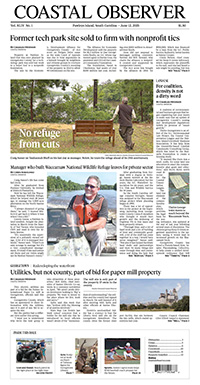Coronavirus
Doctor on front lines braces for new spike

The COVID-19 pandemic is causing an onslaught like Dr. Desmond Young has never seen.
Young, a pulmonologist at Waccamaw Community Hospital, said in the last two weeks, Tidelands Health’s two hospitals in Georgetown County have seen a “horrific increase” in the number of COVID-19 patients and the severity of their illness. At the same time, doctors are also treating patients with a variety of other ailments.
“Our ICUs are running at near or full capacity. It seems to be daily, we are seeing more patients in need of hospitalization for treatment,” Young said. “We’ve always have bad flu seasons from time to time that get people in intensive care and can easily test the boundaries of our health care system, but this has never happened in my 20-year career.”
He expects another COVID-19 spike within the next week because of the Fourth of July holiday.
“Until we get the public to understand the potential severity of this disease and to respect social distancing, hand washing and other guidelines sent out by the CDC that we all know and have heard of now, I think we’re going to have a tough time managing this disease,” Young said. “Until everyone practices safe coronavirus precautions, we’re going to have these problems. We all have to participate.”
Young has been on the front lines of the pandemic from the beginning. Many things worry him: the patient volume, the degree of illness of the patients, the quick onset of the disease and symptoms, and the severity of the disease.
“It’s very emotionally and mentally stressful knowing that there isn’t an effective cure and treatment,” Young said. “Direct treatment for the virus is reasonable at best. We only have limited options for treating the virus itself. Without a cure this is a very difficult disease to manage.”
In April, Young said that some of the medications to treat the symptoms of the coronavirus have dangerous side effects.
“It’s almost flipping a coin no matter what we do,” Young said. “You don’t see many things like this.”
In June, confirmed cases of COVID-19 tripled in the state, from 12,148 to 36,297 and grew from 76 to 458 in the county. In the first eight days of July, 12,000 more cases have been reported in the state and 232 more in the county.
A third of the confirmed cases in the state are people 30 years old or younger, according to state Department of Health and Environmental Control, People between the ages of 21 and 30 account for the largest share of cases: 22 percent.
“Two weeks ago … we were seeing a higher positivity rate in young people tested for COVID-19,” said Dr. Gerald Harmon, vice president of medical affairs for Tidelands. “Now, we’re seeing increasing hospitalizations of young and middle-age individuals.”
Individuals under 65 have accounted for 50.5 percent of COVID-19-positive patients at county hospitals since June 15. Thirty-eight percent were ages 41-64 and 10 percent were ages 26-40.
“Don’t believe this virus only affects the elderly – that’s not true,” Harmon said. “Don’t believe it’s just like the flu – that’s also not true.
Young acknowledged that most of the people who contract COVID-19 don’t get sick enough to end up in a hospital ICU.
“The majority of people who get infected will have minimal, if any, symptoms. It won’t significantly affect their health,” Young said. “But it’s the people who are at-risk, and some who are not even at-risk, who go on to develop severe disease that can lead to death. Those patients tend to have a very prolonged hospital course, if they can survive.”
Tidelands has done a great job keeping adequate staffing levels and PPE supplies, Young said. But he is worried about resources becoming stretched in the near future. And he’s worried about health care workers getting sick.
“This virus is so contagious that no matter how well you try to protect yourself when somebody has the virus, there are times when exposure sometimes is inevitable because you just don’t know who has it,” he said.
Young expects there to be a vaccine for COVID-19 sometime next year, but he isn’t sure how safe and effective it will be.
“I don’t think this is going away anytime soon. We’re going to have to live with this for a very long time,” Young said. “The hope of a vaccination is very real and it’s going to happen. I think it’s just a matter of time.”
Young hopes that hand washing, wearing a and social distancing become “cool.”
“These safe practices need to become the norm,” Young said. “They need to become something that if you’re not doing it, you’re pointed out for being on the wrong side of humanity.”




